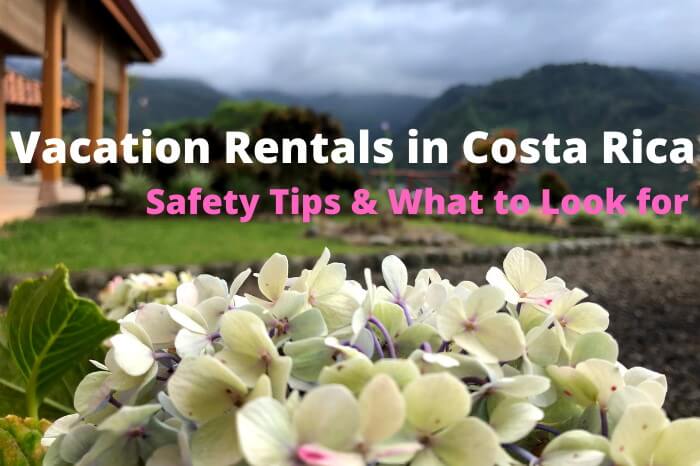Vacation rentals like Airbnbs can be a great option in Costa Rica. They fit big groups, give you more space, and let you cook in if you want. Since many are hosted by Costa Ricans, they also can help you travel like a local. But there are some important things to know when deciding to stay in a vacation rental instead of a hotel. In this post, we’ll give you some tips on choosing vacation rentals in Costa Rica. We’ll also cover important safety tips.
What to Look for in a Vacation Rental
Location
While it is easy to get distracted by pretty pictures of palm trees or sparkling pools, one of the most important parts of an Airbnb or Vrbo listing is its location. A gorgeous house with an ocean view 30 minutes outside town with nothing around is probably less desirable than a similarly nice house right near attractions.
Airbnb and Vrbo/HomeAway have maps in their listings to help with this. These give a general idea of where a property is located. But the problem with these maps is that they rely on the property owner/manager putting the map point in the right location. We have found from helping clients with their vacations, that often, the map points are very off.
Sometimes the listing description will give a sense of the location. Just keep in mind that these are sales listings, for sales purposes, so the write up usually makes the property (and its location) a bit sunnier than reality. That has been our experience after renting Airbnbs many times in Costa Rica.
Often, reviews are the most reliable source of information. Previous guests will often give good clues about location (walking distance to the beach, near restaurants, need to drive to get places, etc.). Reviews are always essential to read.
If you still can’t figure out the location, message the host and ask for more specifics.
Included Amenities
Airbnb and other vacation rental websites usually have a place that lists a property’s amenities. While many people focus on things like a pool or outdoor terrace, there are other important basics to look for when booking a vacation rental in Costa Rica. Some key amenities that we cover below are hot water, air conditioning, and Wi-Fi.
High-end vacation rentals usually come with these things. However, it can vary with mid-range and budget options.
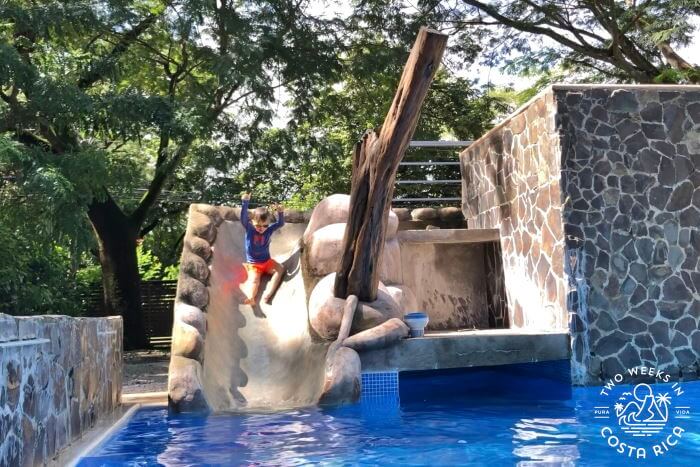
Hot Water
Hot water for showering can be provided directly through the pipes like in North America and elsewhere. In budget accommodations in Costa Rica, though, a so-called “suicide shower” is often used instead.
These are small electric hot water heaters. They are installed as part of the showerhead and heat the water on demand. They vary from very simple plastic devices with wires sticking out, to more elaborate heating systems with temperature gauges. In our experience, they work fine but don’t expect to have the best shower. Usually, you have to keep the water pressure low in order for the water to stay hot.
In some beach areas, vacation rentals may not have hot water at all. So be sure to double check the listing.
Air Conditioning
In Costa Rica, air conditioning is most common in beach destinations. Mid-range vacation rentals and all high-end rentals usually have air conditioning, though there are exceptions. Most often, individual A/C units are in each room. More rarely, in high-end homes, you will find central air.
Since many people enjoy indoor-outdoor living, some vacation rentals do not have air conditioning at all. They rely on air flow and natural breezes to keep it cool. These types of houses tend to be more open, often with large doors that swing out to the rainforest.
This works for many people, as the jungle does cool down a lot at night. However, if you are prone to the heat or humidity, you may want A/C, at least for sleeping. Having a home that closes also helps keep out any biting insects and other creepy crawlies.
In some areas where it is cooler, don’t be surprised if a property doesn’t have air conditioning. In higher altitude places like San Jose and its surrounds, Atenas, Grecia, Monteverde, and San Gerardo de Dota, you don’t need it. In some of these areas, heaters are provided instead.
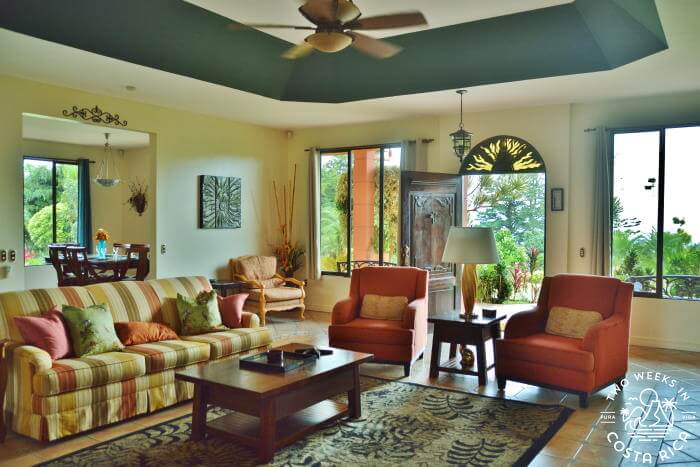
One thing to note about A/C. Since electricity is expensive in Costa Rica, sometimes there will be a daily surcharge to use it. This is usually for budget vacation rentals. Typical surcharges are between $10-20/day.
Wi-Fi
Although Wi-Fi in Costa Rica has improved dramatically in recent years, there are still many areas without a reliable Internet connection.
Airbnb and Vrbo listings do require the host to say whether the vacation rental has Wi-Fi. However, it doesn’t make them say how fast it is or if it goes down frequently.
If you need a reliable connection for work, see if the listing mentions the connection type. If it is cable or fiber optic, chances are, it is fairly fast and reliable. If it is a 4G wireless connection, it may be slow and stop working when a lot of people are using it, or it could be alright. It’s always good to check the reviews to see what other guests have said. You could also message the host directly.
Supplies
While some Airbnbs in North America and elsewhere have hotel-like amenities, usually this is not the case in Costa Rica. The basics like dish soap, trash bags, coffee filters, and things like that will be provided. But usually, toiletries aren’t unless it’s a very nice rental.
For cooking, we have found that it really varies. Some rentals have cooking oil, a few spices, and other basics on hand, while others have nothing or just what’s been left over from previous guests. Cookware is similar. Sometimes, you’ll find nice pots and pans and all the kitchen utensils you could need, while other times, it will be more sparce. Reviews are the best way to figure out how equipped a rental is.
Some houses were built to be vacation rentals so may be somewhat basic. It is common to find simple cooktops without an oven, no dishwasher, and no microwave. This may be fine for a short visit, but if you’re coming for a long-term stay, some of these things could be essential depending on your lifestyle.
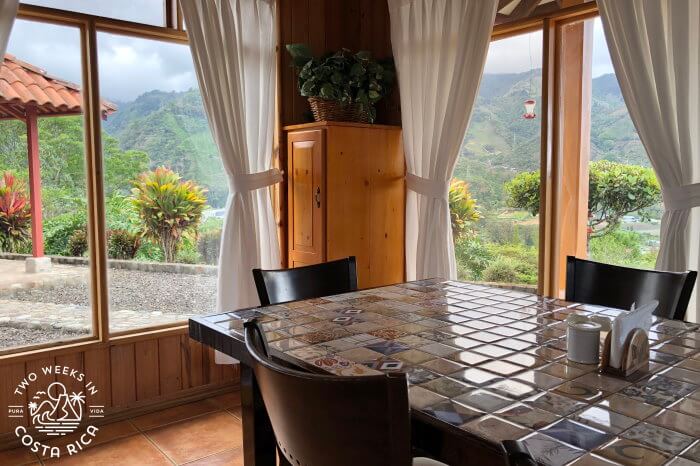
Reviews
As we’ve mentioned a few times above, reviews are key to finding a good vacation rental. We always recommend picking a rental that has at least five reviews, all favorable. Obviously, the best is when you can find a rental that has tons of positive reviews, but that isn’t always possible.
Read at least a couple of pages of reviews to get a sense of what people liked and disliked. We have found that sometimes people will give five stars, but if you go and read their actual review, they had some gripes. We like to call this the “pura vida lenses.” A lot of times people fall in love with Costa Rica on their visit and have the ability to overlook the small things. That is a good thing, unless you want to know the truth about a rental house you’re considering!
One big thing to look out for in vacation rentals is noise problems. Motorcycle noise, dogs barking, and roosters calling in the early morning are common grievances. If houses are close together, you also can have problems with parties and loud music.
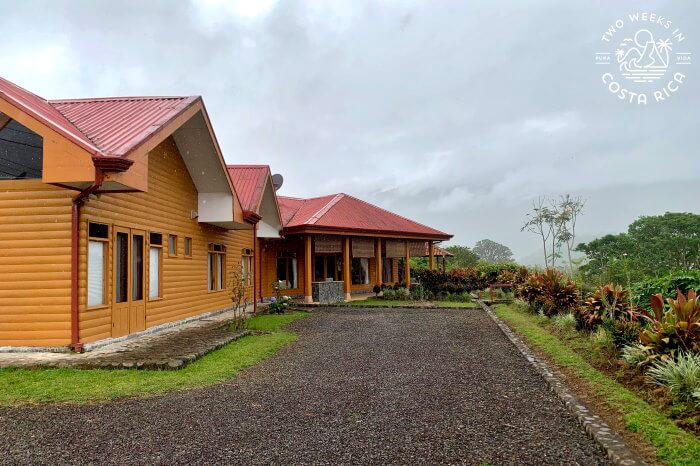
Safety
Overview
This is definitely the most important consideration when staying in a vacation rental in Costa Rica. Unfortunately, we have heard many sad stories of travelers getting robbed during their trip. Obviously, this really ruins the experience so you should do everything possible to avoid it.
The problem with vacation rentals is that they are generally less secure than hotels because they don’t have much of a presence. Hotels have employees, other guests coming and going, and sometimes even guards. These all help to discourage thieves from coming around. Vacation rentals, on the other hand, are usually standalone homes with little to no human deterrents.
Don’t get us wrong, Costa Rica is fairly safe and break-ins are not the norm. Personally, we have not had any problems with break-ins during our almost eight years of living in and traveling the country.
But we are careful. Most common crimes in Costa Rica involve theft so it is important to be aware.
A common time when break-ins occur is when people are out and about, at a tour or at dinner, for example. But we also have heard of people getting robbed while they were sleeping or when leaving the car open when unloading. The crimes are almost always non-violent and not confrontational. They just want your valuables so that they can sell them.
By following some key precautions and carefully choosing a vacation rental with security in mind, you can avoid most problems.
Safety Measures to Look for in a Vacation Rental
One big factor with security is how well the house closes up. Sure, open air living can be nice in the tropics, but it’s important that all doors and windows close well when you need them to. We make sure to close and lock everything when we leave and go to bed.
Figure out the location of the vacation rental. Is it off on its own, or are their other houses around? Is it part of a gated community? This can provide another level of protection.
Aside from how the house is set up, find out what security measures are in place. They may have a security system, deadbolt, fence, or gated entry. Another simple security measure often used in Costa Rica is placing wooden sticks in windows that open horizontally. These prevent people from being able to pry open the window, even if they get them unlocked. Simple, but effective.
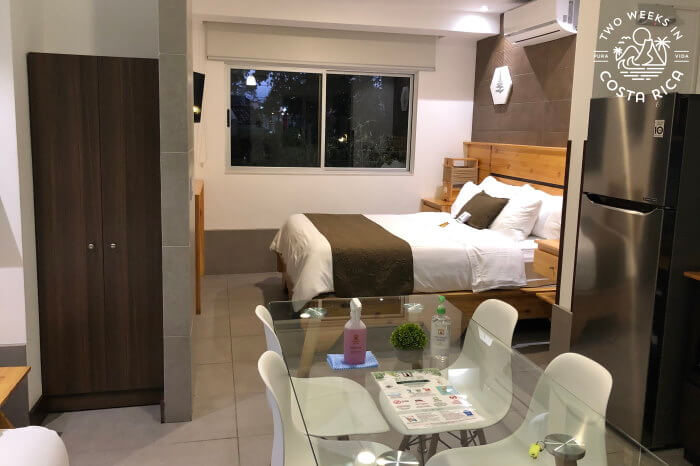
Precautions to Take
Here are some precautions you can take yourself to keep your belongings safe.
Keep valuables away from open windows. A common crime is to cut a screen and grab what’s within arm’s reach.
When unloading your car, keep someone nearby to watch. This will make sure no one runs off with one of your suitcases!
Don’t bring all your most valuable possessions on your trip. If you can avoid bringing your best electronics and jewelry, do it. Nowadays, most people travel with a laptop and camera, but try not to bring your very best equipment.
If the house has a safe or secure closet (bodega), lock up your electronics and valuables when you leave. If it doesn’t, just keep things out of sight as much as possible. That way if someone peeks in a window, they won’t see anything.
Use all security measures that are available. If the house has a security system, don’t forget to arm it before leaving. Close the windows and use the security sticks if they have them. This is simple stuff, but often times, people get in vacation mode and forget.
Conclusion
We hope this post gives you some insight into staying in a vacation rental in Costa Rica. Although there some important things to keep in mind to ensure you have a safe and fun holiday, most people who stay in vacation rentals have a great experience without any problems.
Have a question about staying in a vacation rental in Costa Rica? Ask us below.
Looking for more information to plan your trip? Check out these posts:
Safety Tips for Your Next Trip to Costa Rica: Learn more about safety in Costa Rica. Includes tips for renting a car, taking the bus, and other common things to watch out for.
Family Itinerary for Costa Rica: Rainforest, Beach, and Volcano – If you’re coming with the kids, this sample itinerary will get you started.
Rental Car Discount: If you’re staying in a vacation rental outside town, you’ll probably want a car to get around. Check out our discount to save 10-20% and get free extras like a second driver, car seats, cooler, and surf rack.
Why to Get Travel Insurance for Visiting Costa Rica: Travel insurance is a good idea to protect your investment and in case you need medical care during your trip. Learn about approximate pricing and coverage with this post.

